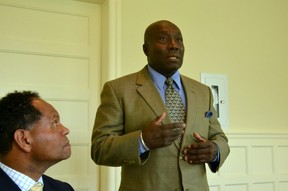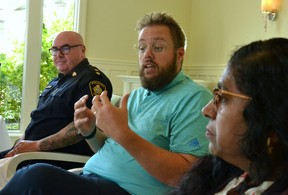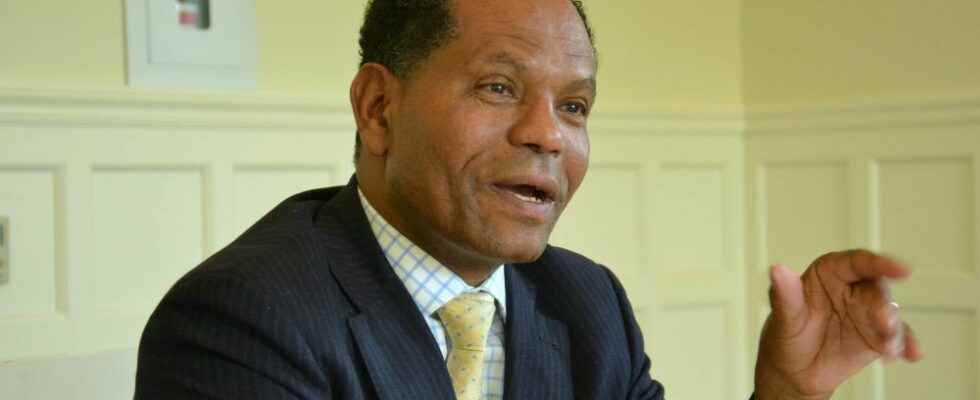The Multicultural Association of Perth Huron called for more resources to address the ongoing newcomer mental-health crisis, further exacerbated as Ukrainian refugees continue to settle in the region, during its annual mental-health workshop Friday morning.

As it continues to help resettle Ukrainian refugees in the region, the Multicultural Association of Perth Huron is calling for more resources to help address the mental-health crisis among newcomers.
At the association’s annual mental-health workshop at The Bruce Hotel in Stratford Friday, association volunteers who have been helping resettle Ukrainians and other newcomers in the region spoke about the often unseen pressures newcomers face in addition to the language, cultural, housing, employment and other hurdles they need to overcome.
“My family, which settled in Stratford, when they were leaving (Ukraine) they were bombed six times on the train,” said Oksana Yakymova, an association volunteer who has been helping resettle both members of her extended family and other Ukrainian refugees in the area since the Russian invasion began in February. “Children witnessed it, adults witnessed it. They survived … (but) a lot of these people (endured) sirens, constant sirens, blasting, children running. And school has started in Ukraine, too. They have to go in underground bunkers that each school has.
“They come here with a lot of health issues. The number of people they’ve seen killed, the number of corpses, it’s just unimaginable. I have no idea how they’re going through all of this.”
From post-traumatic stress and panic attacks to physical illnesses manifesting from the trauma they endured, Yakymova said it’s clear Ukrainians continue to suffer, often in silence, after they resettle locally in relative safety.

Clinton Springer, a longtime association volunteer who immigrated to Canada from Trinidad more than 40 years ago, also spoke at Friday’s workshop, suggesting that the complex and numerous mental-health issues many newcomers face after leaving their home, family and friends behind to start a new life in Canada requires adequate mental-health resources to determine the individual and specific needs of each newcomer as quickly as possible after they arrive in the region.
“We talk about resources, and I always hear people talk about, ‘We’ve got lots of resources here,’ and we do. I am grateful for all the resources, but these resources have to be specific needs. They have to (address) a specific need,” Springer said. “So first, when we’re bringing people, we have to analyze what their needs are.
“The people coming from Ukraine and a newcomer coming from Trinidad have totally different needs. That period of settlement is not as easy as we perceive it to be. Right now, as the people come in, we don’t deal with their mental-health issues, and when they become part of the fabric of the community in five or 10 years, that’s the man you see (sleeping) outside. That’s the gentleman who says he’s going to commit a crime because the mental-health issues have grown and gotten worse.”
MacGregor Austin-Olsen, a registered social worker and the mental health, wellness and resiliency coordinator with the Stratford Police Service, told those at Friday’s workshop that accessing mental-health services and supports is a challenge for many in the community, not just newcomers. The language barriers and cultural differences many newcomers contend with makes that challenge even more difficult for new immigrants and, particularly, refugees, he added.

“We are in a time, coming out of COVID, when, ironically enough, newcomers and local folks have a lot more in common than they did before,” Austin-Olsen said. “We’re all coming out of a situation where we’ve been pretty isolated, which I think is an interesting mimic to the newcomer (experience) — that idea of coming here and not having a social circle and having to build from zero.
“As far as mental-health supports go, the struggle is real for all, not just newcomers.”
To work towards eliminating the barriers preventing newcomers from getting the mental-health support they need when they need it, not just when they’re experiencing a crisis, Austin-Olsen said it will require strong and long-lasting partnerships between organizations like the multicultural association, the Stratford Police Service, the Huron Perth Healthcare Alliance, local and provincial governments and the many social support services that operate locally.
For now though, the multicultural association has launched a new mental-health emergency hotline at 1-888-308-6274 ext. 1 for area newcomers who need immediate support from a social worker who can help them in their language.
